[ENG -ESP] Series Review | THE FALL OF THE HOUSE OF USHER (2023) | The latest from Flanagan for Netflix

Image edited with Canva



E N G L I S H
The Poean universe is full of wonders for anyone to contemplate. There is so much material with which the cinephile viewer could be dazzled. Although the language is richer in its fullest expression, we cannot forget the visual part that makes our minds work for us.
Many adaptations and references have been made to Edgar Allan Poe's works, some keeping the author's stamp, others, on the other hand, elaborate from the basis of their originality; the source of inspiration will always be focused on the combination of the ancient with the modern.
The Fall of the House of Usher is very rich in the art of fear and tension, and I am talking about the original work. In this review I will tell you about my perspective and opinion on the miniseries recently released by one of the best horror directors Netflix has; or rather, had.
I will express my comparison, both with the multiple references and the very creative way they were carried out; maybe not all of them, but some of them. I will talk about the things I liked and agreed with, where I observed characteristic humor in the whole premise, and which were for me the most interesting chapters.
I invite you to join me in reviewing a serialized story that alludes to one of my favorite writers in history.
E S P A Ñ O L
El universo poeano está lleno de maravillas que cualquiera puede contemplar. Hay tanto material con el cual el espectador cinéfilo podría deslumbrarse. Aunque el lenguaje es más rico en su máxima expresión, no podemos olvidar la parte visual que hace trabajar por nosotros a nuestra mente.
Se han hecho muchas adaptaciones y referencias sobre las obras de Edgar Allan Poe, algunas manteniendo el sello del autor, otras, por su parte, elaboran desde las bases su propia originalidad; la fuente de la inspiración siempre estará enfocada en la combinación de lo antiguo con lo moderno.
The Fall of the House of Usher es una obra muy rica en el arte del miedo y la tensión, y estoy hablando de la obra original. En esta reseña les hablaré de mi perspectiva y opinión sobre la miniserie recientemente sacada a la luz por uno de los mejores directores del terror que tiene Netflix; o mejor dicho, tenía.
Expresaré mi comparativa, tanto con las múltiples referencias y la manera tan creativa en que se llevaron a cabo; quizás no todas, pero si algunas de ellas. Hablaré sobre las cosas que me gustaron y estuve de acuerdo, donde observé un humor característico en toda la premisa y cuales fueron para mí los capítulos más interesantes.
Les invito a acompañarme en esta reseña sobre una historia en formato serie que alude a uno de mis escritores favoritos de todos.

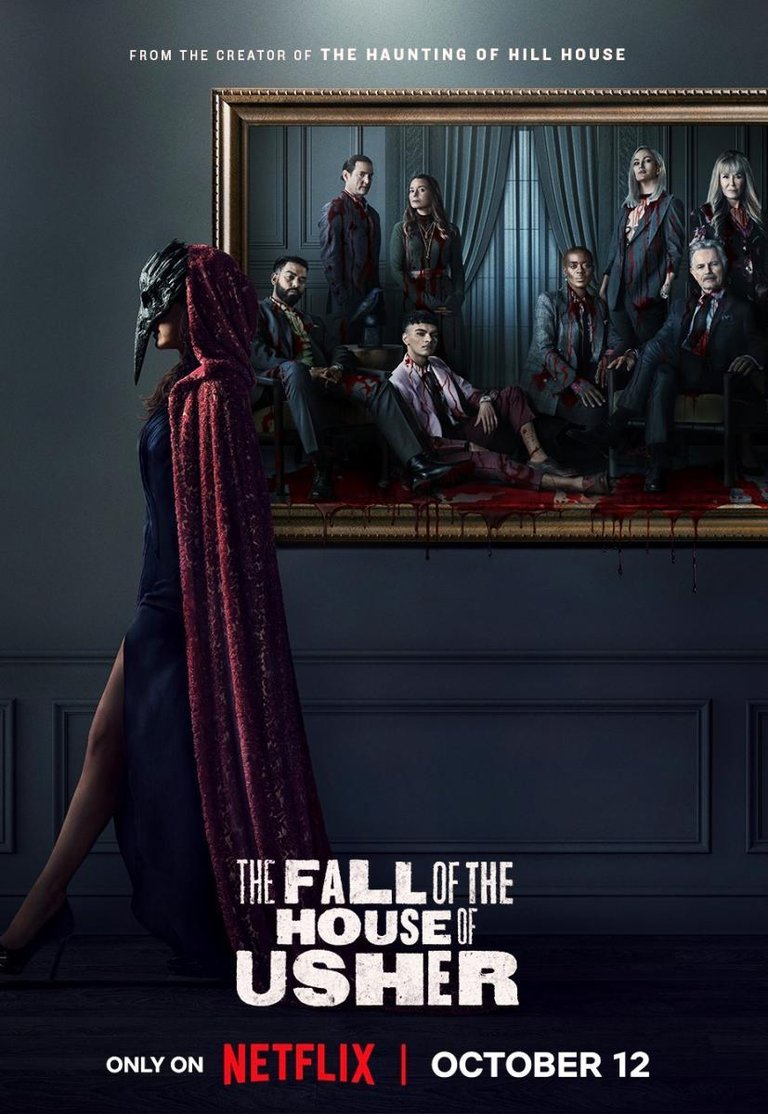
Poster extracted from Filmaffinity

Technical Data
The Fall of the House of Usher is an American gothic horror thriller miniseries directed by Mike Flanagan (creator) and Michael Fimognari. The script was written by Flanagan based on the famous universal writer Edgard Allan Poe. The cast consists mainly of Carla Gugino as Verna; the antagonist of the story, Bruce Greenwood as Roderick Usher, Mary McDonnell as Madeline Usher; Roderick's sister, Henry Thomas as Frederick Usher, Samantha Sloyan as Tamerlane Usher, T'Nia Miller as Victorine LaFourcade, Rahul Kohli as Napoleon "Leo" Usher, Kate Siegel as Camille L'Espanaye, Sauriyan Sapkota as Prospero "Perry" Usher, Carl Lumbly as C. Auguste Dupin, Mark Hamill as Arthur Pym, Katie Parker as Annabel Lee and Kyliegh Curran as Lenore Usher.
The miniseries was produced by Intrepid Pictures for the movie and television series platform Netflix. Mike Flanagan was also on board as executive producer, along with Trevor Macy, Emmy Grinwis, Michael Fimognari, and Melinda Nishioka. The series runs for 8 episodes mostly one-hour episodes, which premiered on October 12 of this year.
Ficha tecnica
The Fall of the House of Usher es una miniserie estadounidense de suspenso y terror gótico dirigida por Mike Flanagan (creador) y Michael Fimognari. El guion fue escrito por Flanagan basándose en el famoso escritor universal Edgard Allan Poe. El reparto está conformado principalmente por Carla Gugino como Verna; la antagonista de la historia, Bruce Greenwood como Roderick Usher, Mary McDonnell como Madeline Usher; hermana de Roderick, Henry Thomas como Frederick Usher, Samantha Sloyan como Tamerlane Usher, T'Nia Miller como Victorine LaFourcade, Rahul Kohli como Napoleon “Leo” Usher, Kate Siegel como Camille L'Espanaye, Sauriyan Sapkota como Prospero “Perry” Usher, Carl Lumbly como C. Auguste Dupin, Mark Hamill como Arthur Pym, Katie Parker como Annabel Lee y Kyliegh Curran como Lenore Usher.
La miniserie fue producida por la empresa Intrepid Pictures para la plataforma de películas y series de televisión Netflix. Mike Flanagan también estuvo como productor ejecutivo, junto con Trevor Macy, Emmy Grinwis, Michael Fimognari y Melinda Nishioka. La serie tiene una extensión de 8 capítulos de una hora de duración la mayoría de ellos, los cuales se estrenaron el 12 de octubre de este año.

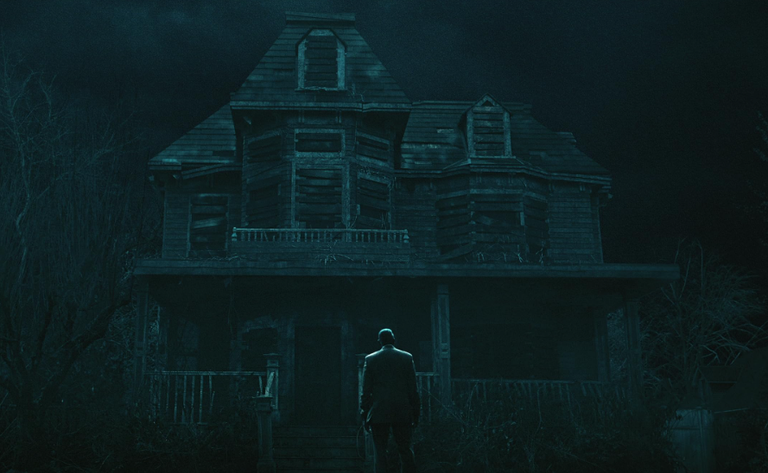
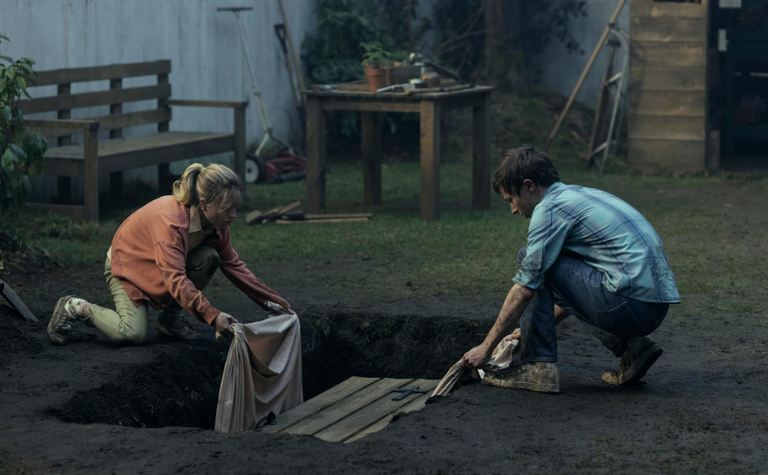
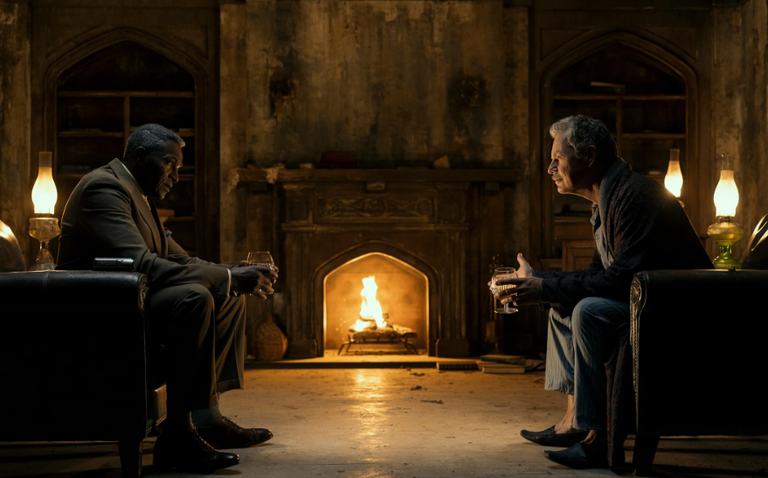

Plot
Taking the names of the main characters in Poe's famous short story, Roderick and Madeline Usher are twins who became principals of Fortunato Pharmaceuticals; Roderick as CEO and Madeline as COO, both creating a strengthened and unstoppable empire, but the Usher house begins to crumble with the individual deaths of Roderick's six children: Frederick; the main heir, Tamerlane; the businesswoman, Victorine; the surgeon, Leo; the video game mogul, Camille; the company's public relations director and Perry; the socialite.
At the beginning of the series, we see Roderick at the funeral of his three eldest children, Frederick, Tamerlane, and Victorine, the last to die. Roderick begins to see eerie images and the figure of a raven that makes him faint outside the church. We then see C. Auguste Dupin, the prosecutor and Roderick's enemy (who has tried to bring the full weight of justice to bear on Fortunato for unlawful crimes against humanity and the environment) being invited by the protagonist to talk in his childhood home.
There, Roderick confesses to Auguste all the corruption and crimes that Fortunato has committed under his rule, and before that, he also tells him how each of his children died, his relationship with his mother, why he was so obsessed with taking over that company, how he rose to become CEO and the time he met with his sister a woman named Verna in a bar on the last night of 1979.
Each chapter will increase the tension with each truth revealed. We will learn about the ruthless deeds committed by the Ushers; their personalities, ambitions, eccentricities, tastes, and excesses. We will see the dark side of Fortunato and the poison he has unleashed on humanity, with two ambitious twins manipulating the helm. We will be introduced to the terrible secret of the head of the Usher family and witness his downfall.
La trama
Tomando los nombres de los personajes principales del famoso cuento corto de Poe, Roderick y Madeline Usher son dos gemelos que se convirtieron en directores de la empresa Fortunato Pharmaceuticals; Roderick como director ejecutivo y Madeline como directora de operaciones, creando ambos un imperio fortalecido e imparable, pero la casa Usher se empieza a derrumbar con la muerte individual de los seis hijos de Roderick: Frederick; el principal heredero, Tamerlane; la empresaria, Victorine; la cirujana, Leo; el magnate de videojuegos, Camille; la directora de relaciones públicas de la empresa y Perry; el socialité.
Al inicio de la serie veremos a Roderick en el funeral de sus tres hijos mayores: Frederick, Tamerlane y Victorine, los últimos en morir. Roderick empieza a ver imágenes espeluznantes y la figura de un cuervo que lo hace desmayarse afuera de la iglesia. Luego vemos a C. Auguste Dupin, el fiscal y enemigo de Roderick (quien ha intentado que la justicia caiga con todo su peso sobre Fortunato por los crímenes ilícitos contra la humanidad y el medioambiente) siendo invitado por el protagonista a conversar en su casa de la infancia.
Allí, Roderick le confiesa a Auguste toda la corrupción y crímenes que ha cometido Fortunato bajo su mandato y antes de eso, también le cuenta como fueron muriendo cada uno de sus hijos, su relación con su madre, el porque estaba tan obsesionado con apoderarse de aquella empresa, como fue que ascendió hasta convertirse en director ejecutivo y la vez que conoció con su hermana a una mujer llamada Verna en un bar la última noche del año 1979.
En cada capítulo aumentará la tensión con cada verdad revelada. Conoceremos los hechos despiadados que cometieron los Usher; sus personalidades, ambiciones, excentricidades, gustos y excesos. Veremos el lado oscuro de Fortunato y el veneno que ha desatado a la humanidad, con dos gemelos ambiciosos manipulando el timón. Se nos presentará el terrible secreto de la cabeza de la familia Usher y seremos testigos de su caída.





My opinion
Before watching the series, I thought it was an adaptation of the original short story, but as I dug my eyes in I realized I was wrong. It turns out that this miniseries is a compilation of well-maneuvered references to different works by Edgar Allan Poe. Upon learning this I was very glad, as it would have been very boring for it to just be an adaptation of a single work; because since I had read the original story, I already knew what was going to happen.
Flanagan places us a story adjusted to our reality, with a prevailing social criticism and a masterfulness in gothic art. Using black comedy in his sophisticated dialogues, he does not depart from the most magnificent and lyrical expression that Poe transmitted to us through his works.
Both the series and the original story begin in a very similar way. Poe's story tells us about a man who goes to visit his childhood friend Roderick Usher, who lives in a ruined and time-worn house with his sister Madeline. Both siblings are the only remaining members of the Usher family, suffering from a strange malady that has plagued them for decades.
Decay and tragedy, combined with the beauty of devastation and the grim, were hallmarks of Poe's narrative artistry, utilizing a rather broad rhetoric that leaves the reader hooked. Flanagan seems to have understood this very well and captured as a filter all this expression throughout his work.
He used all these elements well and created a perfect antagonist: Verna, her name is an anagram of the word "Raven", in the Poean universe, the raven is a figure that represents desolation and death, which is why in the series Verna was always present in the deaths of Roderick's offspring. However, Flanagan gives a more diabolical and biting characteristic to this character; as an intangible business collector, omnipresent and with black wings with which he tucks in those whose time has come.
I liked that the names of most of the characters and the titles of each chapter were taken from multiple works by Poe, as well as from historical figures who had a relationship at the time with the writer; for example, that of Lenore, Roderick's granddaughter, her name comes from the poem The Raven, or the name C. Auguste Dupin, the famous detective who makes his appearance in the first literary work on police mystery: The Crimes in the Rue Morgue, then in The Purloined Letter, we also have Rufus Griswold, another character in the series who shares his name with Rufus Wilmot Griswold, a writer, and poet known for his rivalry with Poe. And so we have examples scattered throughout the miniseries.
The script seems to me a marvel; the narrative is full of rhetoric and arguments that leave you hooked with strong analysis. At no time was I bored because the series had well studied how to reach the viewer. It's not just a series for Poe fans. It is detached from that silly thought of only wanting to reach an exclusive audience because it uses characters with whom anyone could connect, understand, interpret, and create a bond. It is a series that, if you pay the slightest bit of attention to it, you will find not only digestible but very enjoyable.
In part, the series is predictable, because from the beginning we know how it will end, but we are not certain how. The photography makes an excellent combination with the costumes, giving us a gloomy panorama of mystery, with dim lights and obfuscated colors, but not enough to obscure our vision and see clearly what is happening.
The horror, although present, is not strong enough; it doesn't have that momentum like other Flanagan series in which The Haunting of Hill House and The Haunting of Bly Manor stand out, it's more like a suspense that becomes terrifying as the events build to a shocking climax. The chapters I liked the most were the fifth "The Tell-Tale Heart" and the last one, of course, "The Raven".
I really liked the performances, it seems that Flanagan and company don't think twice about using the same actors for all their projects, I recognized them all immediately, those from Midnight Mass, The Haunting of Hill House, and The Midnight Club, among others, I think for me the most outstanding performances were from the two actresses who played Madeline Usher as a young and old woman: Willa Fitzgerald and Mary McDonnell, also of course, the performances of Bruce Greenwood as Roderick Usher and Kate Siegel as Camille, both were delightful.
The flashbacks, in the beginning, seemed a bit abrupt, but as you pay attention, you get used to them and you are placed in the timeline naturally. The way in which they used this resource to reveal the most important aspects of the plot seemed excellent to me, because in my case, it kept my curiosity to a certain point, and at no time did I feel that the interest in the narrative arc was deflated.
Mi opinión
Antes de ver la serie, pensaba que era una adaptación del cuento original, pero al meter mis ojos de lleno me di cuenta de que me equivoqué. Resulta que esta miniserie es una recopilación de referencias bien maniobradas sobre diferentes obras de Edgar Allan Poe. Al saber esto me alegré mucho, ya que hubiera sido muy aburrido de que solo fuera una adaptación de una sola obra; porque como he leído el cuento original, ya sabía lo que iba a pasar.
Flanagan nos coloca una historia ajustada a nuestra realidad, con una crítica social imperante y una magistralidad en el arte gótico. Usando la comedia negra en sus sofisticados diálogos, no se aparta de la expresión más magnífica y lírica que Poe nos transmitía a través de sus obras.
Tanto la serie como el cuento original, empiezan de una manera muy similar. La historia de Poe nos cuenta sobre un hombre que va a visitar a su amigo de la infancia Roderick Usher, quien vive en una casa arruinada y carcomida por el tiempo con su hermana Madeline. Ambos hermanos son los únicos que quedan de la familia Usher, ya que padecen un extraño mal que los ha atormentado por décadas.
La decadencia y la tragedia, combinados con la belleza de la devastación y lo lúgubre, eran rasgos distintivos en la artística narrativa de Poe, utilizando una retórica bastante amplia que deja enganchado al lector. Flanagan parece haber entendido muy bien esto y plasmó como un filtro toda esta expresión a lo largo de su obra.
Utilizó bien todos estos elementos y creó a una perfecta antagonista: Verna, su nombre es un anagrama de la palabra “Raven” (Cuervo en español), en el universo poeano, el cuervo es una figura que representa a la desolación y la muerte, es por eso que en la serie Verna siempre estaba presente en las muertes de la descendencia de Roderick. Sin embargo, Flanagan le da una característica más diabólica y mordaz a este personaje; como un cobrador de negocios intangible, omnipresente y con alas negras con las que arropa a quien ya le llega la hora.
Me gustó que los nombres de la mayoría de los personajes y los títulos de cada capítulo fueron sacados de múltiples obras de Poe, así como de figuras históricas que tuvieron relación en su momento con el escritor; como por ejemplo, el de Lenore, la nieta de Roderick, su nombre proviene del poema El Cuervo, o el nombre C. Auguste Dupin, el famoso detective que hace su aparición en la primera obra literaria sobre misterio policíaco: Los Crímenes en la Calle Morgue, luego en La Carta Robada, también tenemos a Rufus Griswold, otro personaje de la serie que comparte su nombre con Rufus Wilmot Griswold, un escritor y poeta conocido por su rivalidad con Poe. Y así tenemos ejemplos esparcidos por toda la miniserie.
El guion me parece una maravilla; la narrativa está repleta de retórica y argumentos que te dejan enganchado con fuerte análisis. En ningún momento me aburrí ya que la serie tenía bien estudiado como llegarle al espectador. No es solo una serie para fanáticos de Poe. Se desliga de ese pensamiento tonto de querer únicamente llegar a un público exclusivo, pues usa personajes con los que cualquiera podría conectar, comprender, interpretar y crear un vínculo. Es una serie que, si le pones el más mínimo de atención, te parecerá no solo digerible sino muy disfrutable.
En parte la serie es predecible, porque desde el principio sabemos cómo terminará, pero no tenemos la certeza de cómo. La fotografía hace una excelente combinación con el vestuario, brindándonos un panorama lúgubre de misterio, con luces tenues y colores ofuscados, pero no lo suficiente para opacar nuestra visión y ver con claridad lo que está pasando.
El terror, aunque está presente, no es suficientemente fuerte; no tiene ese ímpetu como otras series de Flanagan en las que destacan The Haunting of Hill House y The Haunting of Bly Manor, es más como un suspenso que se vuelve terrorífico cuando los sucesos van ascendiendo a un impactante clímax. Los capítulos que más me gustaron fueron el quinto “El Corazón Delator” y el último, por supuesto “El Cuervo”.
Las actuaciones me gustaron mucho, parece que Flanagan y compañía no piensa dos veces en usar a los mismos actores para todos sus proyectos, los reconocí a todos de inmediato, los de Midnight Mass, The Haunting of Hill House, The Midnight Club, entre otras, creo que para mí las actuaciones más destacable fueron de las dos actrices que hicieron de Madeline Usher de joven y anciana: Willa Fitzgerald y Mary McDonnell, también por supuesto, las interpretaciones de Bruce Greenwood como Roderick Usher y Kate Siegel como Camille, ambos estuvieron encantadores.
Los flashbacks, al principio, me parecieron un poco abruptos, pero a medida que vas poniendo atención, te acostumbras y te vas ubicando en la línea de tiempo con naturalidad. La manera en como usaron este recurso para revelar los aspectos más importantes de la trama me pareció excelente, pues en mi caso, mantuvo mi curiosidad hasta cierto punto y en un ningún momento sentí que el interés dentro del arco narrativo se desinflara.


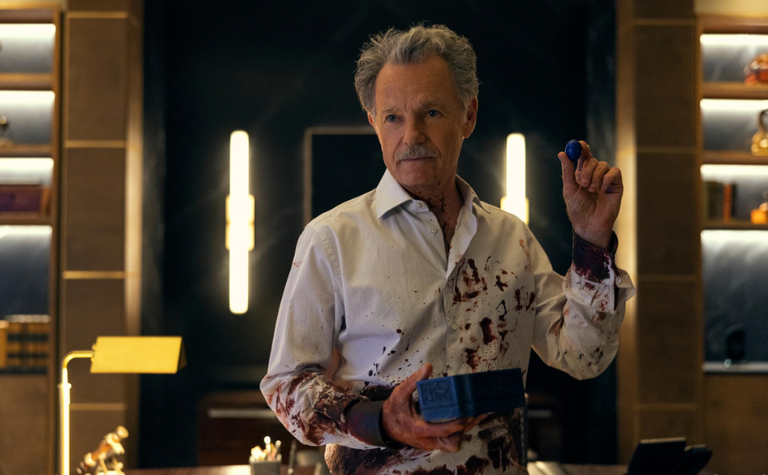
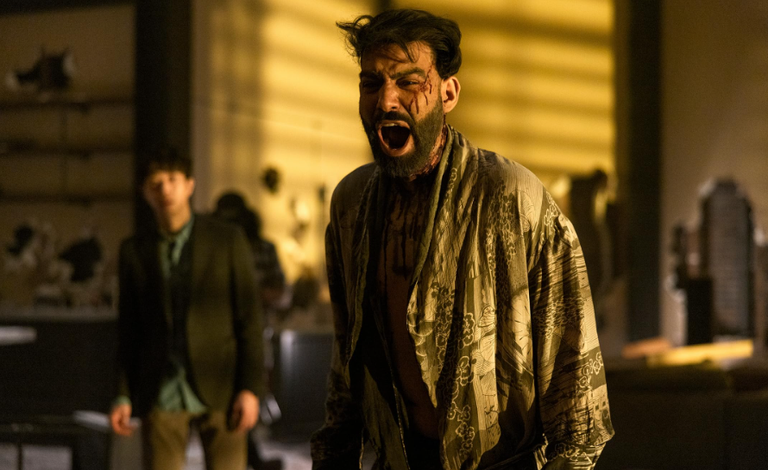

Conclusions
The Fall of the House of Usher, is an excellent tribute in TV series format to the father of the "crime mystery" genre. It uses names and titles from different works of the writer to give us a taste of what to expect. It has an impeccable narrative, which is not at all boring, uses black comedy as a resource, and fluidly articulates the sequence of the story. It is not a series exclusively for a certain audience, but for anyone who loves fantasy, horror, suspense, and mystery. For Edgar Allan Poe lovers, they will enjoy a wide variety of multiple references captured on the small screen. For fans of Flanagan, you will enjoy his story arc and genius, the trademark that has made him famous as a horror director.
I tried not to do spoilers during my writing as little as possible, I don't want to ruin the surprises for those who haven't seen the series. If you've already seen it what did you think, were you captivated, shocked, or stunned, do you think it's a worthy work for the famous writer portraying the famous writer of the gothic tale? I'll read you in the comments.
Conclusiones
The Fall of the House of Usher, es un excelente tributo en formato de serie de televisión para el padre del género “misterio policíaco”. Utiliza nombres y títulos de diferentes obras del escritor para darnos un abreboca sobre lo que vamos a esperar. Tiene una narrativa impecable, que no es para nada aburrida, utilizando la comedia negra como recurso, y que articula de manera fluida la secuencia de la historia. No es una serie exclusiva para cierto público, sino para cualquiera que ame la fantasía, el terror, el suspenso y el misterio. Para los amantes de Edgar Allan Poe, disfrutaran de una gran variedad de múltiples referencias plasmadas en la pantalla chica. Para los fanáticos de Flanagan, gozaran de su arco argumental y genialidad, la marca que lo ha hecho famoso como director de terror.
Intenté no hacer spoilers durante mi escrito lo menos posible, no quiero arruinar las sorpresas para aquellos que no han visto la serie. Si ya la has visto ¿qué te pareció? ¿Te ha cautivado, conmocionado o pasmado? ¿Piensas que es una obra digna para el famoso escritor que representa al famoso escritor del relato gótico? Te leo en los comentarios.

Official trailer from YouTube
Trailer oficial de YouTube

The images were extracted from here
Las imágenes fueron extraídas de aquí



Written by @universoperdido. October 24, 2023
Escrito por @universoperdido. 24 de Octubre del 2023


Al principio no entendía muy bien de qué iba la serie, y poco a poco fue que fui adaptándome, me gustaron sobre todo los episodios finales, porque es cuando la crítica social que mencionas como que se hace más presente, y algunos diálogos me resultaron interesantes, sin embargo no sé... No llegué a conectar mucho con los personajes. No me parecieron tan creíbles.
Sería difícil llevar lo hermoso de Poe a la pantalla, pero al menos hicieron el intento. Me gustó mucho tu reseña. Saludos 😊
A mí sí me gustó la manera en como encajaron las diferentes obras del escritor. Es que todo hacía referencia a Poe, la escenografía, los vestuarios, las frases en los diálogos, todo un universo dedicado a las obras del escritor.
Llevar una extensa bibliografía literaria a la gran pantalla no debe ser nada fácil, sobre todo si tienes un límite y tienes que eliminar mucho material que pueda parecerte irrelevante, sin embargo pienso que esto quedó muy bien.
Ciertamente los personajes no son nada realistas ja ja ja, pero creo que eso es parte de la sátira social que el creador quería exponer.
¡Gracias por leerme y comentar!
A mí me encantó, creo que fue un tributo moderno a Poe y eso la hizo especial. Mantuvo la esencia de los cuentos y la mezcló con la realidad actual de una manera extraordinaria. Cuando Netflix me puso el mensaje de que el siguiente capítulo se llamaba "La máscara de la muerte roja" casi salto del asiento, yo no sabía que cada capítulo estaría enfocado en un cuento y eso me fascinó. A pesar de haberlos leído todos y de saber qué pasa, igual fue un gusto ver cómo lo adaptaban al contexto actual.
Sin duda, fue un gran trabajo y una gran serie que disfruté bastante.
Estoy de acuerdo contigo, esto ha sido un bueno compendio de referencias para el escritor. Creo que las referencias y como fueron ejecutadas hablan por sí solas. Me alegra de que no haya sido solo una adaptación más de una obra literaria.
¡Gracias por leerme!
https://inleo.io/threads/universoperdido/re-universoperdido-2y2whktd2
The rewards earned on this comment will go directly to the people ( universoperdido ) sharing the post on LeoThreads,LikeTu,dBuzz.